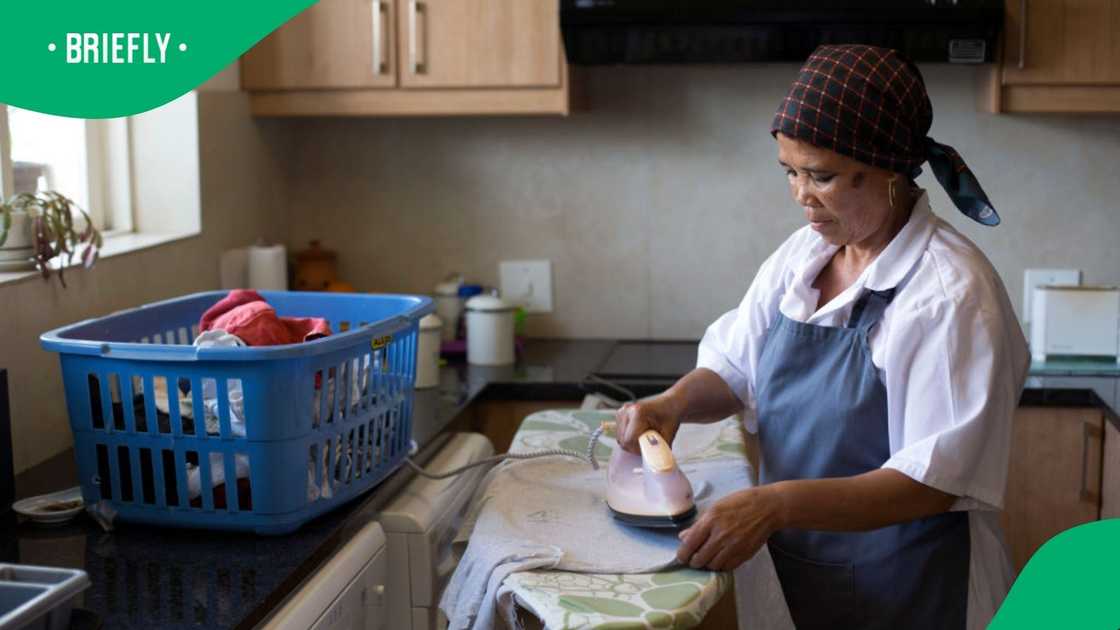South Africans Debate After Government Announces Minimum Wage Increase for Domestic and Farm Workers
- The South African government announced on 4 February 2025 that the minimum wage has been increased
- It gazetted the announcement and said the minimum wage is now R28,79 per hour for farmworkers and domestic workers
- This means that domestic workers are expected to earn R4,989.88 monthly, a figure that caused a heated debate
Tebogo Mokwena, a dedicated Briefly News current affairs journalist, contributed coverage of international and local social issues like health, corruption, education, unemployment, labour, service delivery protests and immigration in South Africa during his seven years at Daily Sun and Vutivi Business News.

Source: Getty Images
JOHANNESBURG — The South African government announced that the minimum wage has increased, and this includes domestic workers and farmworkers. South Africans debated the increase, with some complaining that they could not afford it.
How much is the wage increase now?
Siya posted a screenshot of the gazetted announcement on his @SS_Tembe X account. It revealed that as of 4 February 2025, the national minimum wage is R28,79 per hour. The gazette stated that domestic and farm workers are entitled to R28,79 for every hour they work. Siya calculated that a domestic worker should get paid R4,989.88 per month.
PAY ATTENTION: Briefly News is now on YouTube! Check out our interviews on Briefly TV Life now!
Read the X tweet here:
Recent changes to South African policies
- President Cyril Ramaphosa signed the contentious Expropriation Act into law in January 2025
- He signed the Basic Education Laws Amendment Act into law shortly after the 2024 general elections
- He also signed the National Health Insurance Act into law two weeks before the 2024 general elections

Source: Getty Images
What did South Africans say?
A debate raged in the comment section between those who had questions about what the wage increase meant for their domestic workers.
Andre Froneman said:
"60% of my white mates don't get paid that must so will never be able to afford a worker."
Mzansi's No1 asked:
"What happens if I can only afford R3.5K?"
Siya answered:
"Then you can't afford a full-time helper. Maybe have one who comes in twice a week."
Mthokozisi Mpungose said:
"Most exploited domestic workers are working for us black people."

Read also
MK Party members embark on “Where Is My Vote” march, SA amused as party maintains votes were stolen
Douglas Wayne said:
"That will never happen. she'll get what she wants and if she doesn't like it, she's welcome to seek employment elsewhere."
Understanding the minimum wage
The National Minimum Wage is a legislature that was introduced in 2019. It is a legal requirement set by the government to protect workers from being underpaid. It plays a pivotal role in fighting poverty and ensuring fair compensation to workers. The minimum wage is received annually by the National Minimum Wage Committee and its recommendations are based on economic factors and the cost of living.
The wage applies to all workers regardless of the industry or contract terms but there are a few exceptions such as volunteers, members of the South African Defence Force (SANDF) and other government entities. Expanded Public Works Programme (EPWP) are exempt from this legal requirement and fall below this minimum wage category.
No employer can pay its employees below the stipulated amount unless they apply and receive an exemption from the Department of Labour. Failure to comply may lead to penalties, including fines and legal consequences. Employers should review their pay structures and implement necessary adjustments before the deadlines. Employees are well within their rights to report any violations to the Department of Labour or the Commission for Conciliation, Mediation and Arbitration (CCMA).
Besides the new minimum wage, employers must also consider other labour laws, such as regulations on working hours, overtime pay, and employee benefits. Compliance with these laws not only helps avoid legal issues but also produces a fair and productive work environment.
Parliament to increase its cleaners, chefs, and waitstaff salaries
In a related article, Briefly News reported that Parliament announced that its waitstaff, cleaners, cooks and chefs will earn R28,600 a month by 2026. The announcement came after the National Education Health and Allied Workers Union (Nehawu) negotiated for an increase.
The union revealed that it has been negotiating for the salary increase for years and reached an agreement with the government. They received their first increment in December and will receive their second and third in April and May 2026.
PAY ATTENTION: Follow Briefly News on Twitter and never miss the hottest topics! Find us at @brieflyza!
Source: Briefly News



